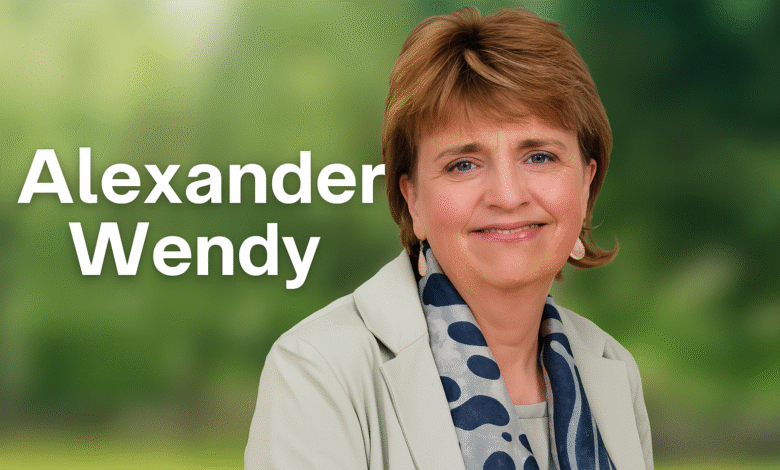Wendy Alexander: A Visionary Leader in Scottish Politics and Higher Education
From Political Reform to Global Academic Influence – The Journey of Baroness Alexander of Cleveden

Introduction
Wendy Alexander, widely known as Wendy Cowan Alexander, is a prominent Scottish figure who has made her mark in both the political and academic worlds. From shaping Scotland’s devolution in the late 1990s to influencing global higher education policy, her career reflects dedication, reform, and impact. She now serves as a life peer in the House of Lords under the title Baroness Alexander of Cleveden.
This biography explores her journey from early education to ministerial leadership, and her continued influence in academia and governance. Through her unwavering commitment to public service and innovation, Wendy Alexander has become an icon of leadership in modern Britain.
Quick Bio
| Full Name | Wendy Cowan Alexander, Baroness Alexander of Cleveden |
|---|---|
| Date of Birth | June 27, 1963 |
| Birthplace | Glasgow, Scotland |
| Nationality | British |
| Ethnicity | Scottish |
| Accent | Scottish (Glasgow) |
| Education | University of Glasgow, University of Warwick, INSEAD |
| Spouse | Brian Ashcroft (separated) |
| Children | Twin children |
| Occupation | Politician, Academic Leader, Peer |
| Known For | Scottish Parliament service, Higher Education Leadership |
Wendy Alexander was born in Glasgow, Scotland, on June 27, 1963, into a family that valued public service and intellectual pursuit. Her upbringing in a politically aware household laid the foundation for her future path. She attended Park Mains High School in Erskine before earning a prestigious scholarship to the Lester B. Pearson United World College in Canada.
She pursued higher education with passion, earning a First-Class MA in Economic and Modern History from the University of Glasgow. This was followed by an MA in Industrial Relations from the University of Warwick and an MBA from INSEAD, one of the world’s leading business schools. Her educational journey would later shape her contributions to economic policy and educational reform in Scotland.
Career Beginnings and Political Involvement
Wendy began her professional life as a management consultant with Booz & Co., where she worked on strategic projects across Europe, North America, Asia, and Australasia. Her transition into politics came in 1997 when she became a special adviser to Donald Dewar, Scotland’s first First Minister. In this capacity, she contributed to the Devolution White Paper and the Scotland Act 1998, which laid the legal foundation for the modern Scottish Parliament.
This early experience in governance and legislative design gave Wendy Alexander the platform to run for public office. In 1999, she was elected as the Member of the Scottish Parliament (MSP) for Paisley North and immediately began to influence key areas of policy and reform.
Rise in Scottish Parliament and Ministerial Roles
Wendy Alexander’s political career flourished quickly. She held several key cabinet positions, including Minister for Communities and later Minister for Enterprise and Lifelong Learning. In these roles, she was responsible for policies ranging from affordable housing to broadband development, modern apprenticeships, and science strategy implementation.
Her work led to significant improvements in social justice, particularly through initiatives like free central heating for pensioners and homeless legislation. Wendy’s ability to navigate complex policy areas while remaining focused on real-world outcomes earned her respect across party lines.
Leadership of Scottish Labour and Political Challenges
In September 2007, Wendy Alexander became the leader of Scottish Labour in the Scottish Parliament. She introduced a new wave of ideas focused on literacy, early childhood education, and social care reforms. She was also instrumental in advocating for further devolution, working closely with the Calman Commission to enhance Scotland’s fiscal autonomy.
However, her leadership tenure was short-lived. In 2008, she stepped down following a donation controversy, even though the Electoral Commission later ruled no wrongdoing. This marked a turning point in her political life, but her commitment to public service continued in other impactful ways.
Academic and International Education Leadership
After her political departure, Wendy shifted her focus to academia. She became Associate Dean at London Business School and later joined the University of Dundee as Vice‑Principal (International) and Professor of International Education. In this role, she helped raise Dundee’s global profile, particularly in attracting international students and forging partnerships.
Her leadership earned her recognition as a Fellow of the Royal Society of Edinburgh in 2016. She also served as a Scottish Government Trade & Investment Envoy for Higher Education and contributed to advisory boards in both the public and private education sectors.
Appointment to the House of Lords
In 2025, Wendy Alexander was appointed to the House of Lords as Baroness Alexander of Cleveden. Her peerage recognized decades of service to Scotland’s political and educational landscape. She delivered her maiden speech in March 2025, emphasizing themes of innovation, inclusion, and educational opportunity.
As a member of the House of Lords, she continues to advocate for thoughtful legislation on social equity, public sector reform, and global education strategies. Her deep experience in policy, combined with academic insight, makes her a powerful voice in shaping the UK’s future.
Personal Life and Public Image
Wendy Alexander was married to economist Brian Ashcroft in 2003. Together they had twin children. One of her children publicly transitioned in 2020, and Wendy has been supportive of inclusivity and identity rights, adding a personal dimension to her public advocacy.
Known for her calm demeanor and analytical approach, Wendy commands respect as both a reformer and a scholar. Her Scottish roots and Glasgow accent remain part of her identity, even as her influence extends far beyond.
Legacy and Lasting Contributions
Wendy Alexander’s legacy lies in her fearless commitment to modernization—whether in politics or academia. Her work on Scotland’s devolution, social justice policies, and education internationalization has left an enduring impact. She is considered a trailblazer among women in Scottish politics and a role model for aspiring leaders in public service and education.
Even after leaving elected office, she continues to shape national conversations on governance, education, and equality. Her journey from policy adviser to Baroness is a testament to the power of vision and perseverance.
Conclusion
Baroness Alexander of Cleveden’s legacy is one of strategic leadership and progressive reform. From her pivotal role in Scotland’s devolved government to her transformative contributions to higher education, Wendy Alexander has consistently pushed boundaries for the betterment of society. Her journey underscores the importance of adaptability, intellect, and moral courage in public life.
As she continues her work in the House of Lords and with global education initiatives, Wendy Alexander remains a beacon of forward-thinking leadership. Her story is not only a personal success but also a powerful example of how dedicated individuals can shape national identity and global progress.
Frequently Asked Questions (FAQ)
Q1: Who is Wendy Alexander?
A: Wendy Cowan Alexander, known formally as Baroness Alexander of Cleveden, is a Scottish politician, academic leader, and member of the House of Lords.
Q2: What roles has she held in Scottish politics?
A: She served as an MSP from 1999 to 2011, held multiple ministerial roles, and was leader of Scottish Labour in the Scottish Parliament from 2007 to 2008.
Q3: What is her educational background?
A: She holds degrees from the University of Glasgow, the University of Warwick, and an MBA from INSEAD.
Q4: What did she do after leaving politics?
A: She led global education initiatives at the University of Dundee and now serves in the House of Lords.
Q5: What are her key contributions?
A: Devolution reform, social justice initiatives, and higher education leadership in Scotland and globally.



